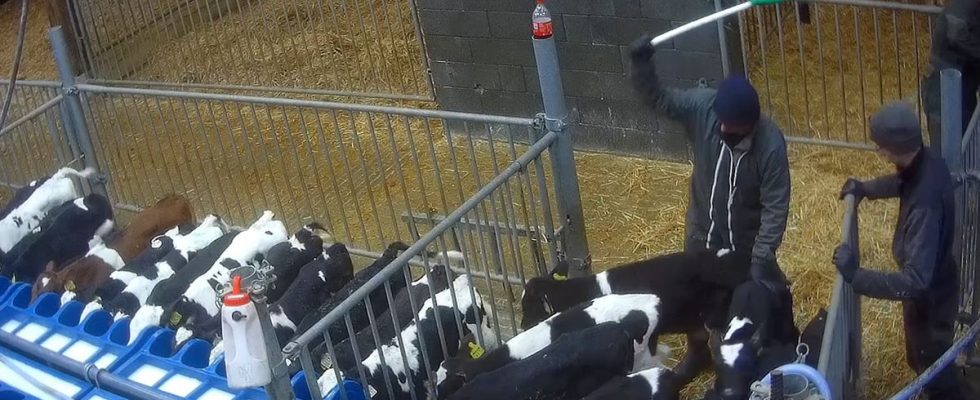Calves which on a row of artificial teats but which receive, for those who linger too long, blows from oars and barriers… The images published this Monday evening by L214 come from a new investigation into cases of bad treatments on farm animals which the NGO has made a specialty of. Most often, the abuses take place on the farms themselves or in the slaughterhouses.
This time, the sequence, shot with a hidden camera, at the end of March, takes place in the Jean-Luc Pignet transit center, near Cherbourg (Manche). This is where, each year, 150,000 infant dairy calves from Ireland, just landed from Ireland, stop off before heading back to the Netherlands, which is home to the three largest specialized industrial groups in Europe. in calf fattening.
“The whole journey that feels like hell”
If the most striking images of this new six-minute survey, carried out with the NGOs Ethical Farming and Eyes on Animals, are shot in Cherbourg, “this whole journey is a real hell for these young animals who are between fifteen days and three weeks old. “, insists Bérénice Riaux. The L214 investigator followed all of one of these transfers, “which began on March 21 in Ireland and ended on the 24th in the Netherlands”, being certain in advance that she would find violations to European regulations. This requires, for long transport of unweaned calves, that the latter be watered and fed after 9 hours and unloaded after 19 hours of transport. “But this regulation is systematically flouted and the authorities close their eyes, deplores Bérénice Riaux. We have already denounced on three occasions, to the European Commission, infringements observed during previous investigations into infant calves between Ireland and the Netherlands. »
L214 noted new violations at the end of March. A first step is to send them to cattle markets where they will be auctioned, around 10 euros, traces L214. They then board 300 in cattle trucks. And the problems are already there for Bérénice Riaux: “These infant calves, far from being weaned, depend solely on milk to feed themselves. However, these trucks, originally designed to transport adult cattle, are not at all suitable for distributing this milk, if only because the drinking troughs are positioned too high. »
Between 27 and 40 hours spent without food
Direction the port of Rosslare, in the south-east of the island, where the cattle trucks embark for a ferry, direction Cherbourg. “Boarding and disembarkation times are already very long, but the crossing we followed was more complicated than expected due to bad weather,” continues the L214 investigator. In total, it will have lasted 23 hours. Then, the cattle trucks all arrive at the transit center at the same time, so unloading the animals again takes a long time. There was a difference of up to seven hours between the first and last calves fed. »
In the end, the three NGOs estimate between 27 and 40 hours the time spent by these calves without being fed and unloaded on the journey they followed. However, they are far from being at the end of their sentence. “This transit center may have a displayed capacity of 2,800 cattle, the number in which these calves land that day and the lack of personnel in front makes things overflow very quickly, denounces Bérénice Riaux. These employees come to mistreat, in an intolerable way, these calves which cling too long to the teats. And despite the blows, we can clearly see that they are still coming back to the charge, which shows how hungry, stressed and disoriented they are. »
Accompanied during the investigation by MEPs Caroline Roose and Anja Hazekamp, L214 will immediately report to the Departmental Directorate for the Protection of Populations (DDPP) of the Channel. “They intervened the next day in the transit center and had it closed for eight days,” says Bérénice Riaux. But on the grounds that the calves were preparing to leave the center after 11 hours of rest when this break must last at least 12 hours. There was still more problematic in this journey of three days. »
Complaints filed
L214 then makes this new investigation yet another testimony to what is wrong with our way, today, in intensive farming, “which transforms these animals, even those just out of their mothers’ wombs, into commodities whose vital needs are absolutely unknown”, adds the investigator. Their last six months of life, in the Netherlands, will hardly be happier. “They will be fattened in a closed building, without access to the outside, for six months before taking the road to the slaughterhouse”, unfolds Bérénice Riaux.
L214 demands, no more and no less, the end of the long transport of unweaned calves from Ireland. This new investigation leads the association to file a complaint with the prosecutor of Cherbourg, against the transit center Jean-Luc Pignet, for serious abuse. It will also file a formal complaint, with the European Commission, this time against Ireland, France and the Netherlands for violation of the regulations relating to the protection of animals during transport. “Hoping, this time, that we will not be told that it is an isolated act”, implores Bérénice Riaux.

